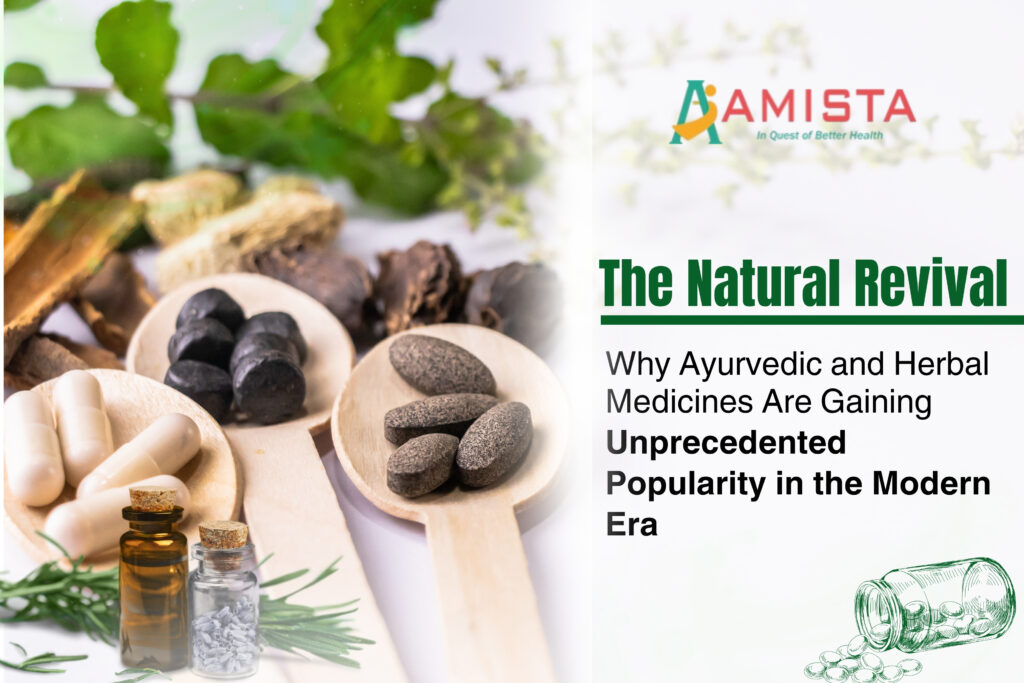At the PCD pharma franchise of Amista Labs, our core identity is deeply rooted in cutting-edge scientific exploration, driven by an unwavering commitment to understanding the intricate mechanisms of health and disease. While our primary focus lies in pioneering innovations within conventional medicine, we also maintain a vigilant and keen interest in the rapidly evolving landscape of global health. Among the most compelling shifts we’ve observed in recent years is the phenomenal surge in the popularity of Ayurvedic and herbal medicines, not just in their traditional heartlands but across continents.
From the bustling markets of Kolkata to the wellness centers of California, there’s an undeniable and growing consumer preference for natural and holistic healthcare solutions. This burgeoning trend transcends mere fad; it signifies a profound societal pivot towards holistic wellness, preventive healthcare, and a deeply ingrained desire for therapeutic approaches perceived as more harmonious with the body’s innate wisdom. Today, we explore the multifaceted and compelling reasons underlying this widespread natural revival.
A Legacy of Healing: Decoding Ayurvedic and Herbal Traditions
To truly appreciate the current resurgence, it’s essential to understand the rich lineage of these healing systems.
Ayurveda, a Sanskrit term meaning “The Science of Life,” is an ancient Indian system of traditional medicine with a documented history spanning over 5,000 years. It stands apart from many conventional medical systems by offering a comprehensive philosophy of holistic health that transcends mere symptom management. Ayurvedic principles are rooted in the belief that health is a delicate balance of the body’s three fundamental energies, or Doshas (Vata, Pitta, and Kapha), interwoven with lifestyle, diet, emotional state, and environmental factors. Treatments are highly individualized, often involving dietary adjustments, lifestyle modifications, detoxification therapies like Panchakarma, yoga, meditation, and, critically, the extensive use of plant-based remedies. It aims to restore balance and harmony, empowering the body’s inherent capacity for self-healing.
Herbal medicine, in its broader global context, refers to the therapeutic use of plants for medicinal purposes across diverse cultures and historical periods. From the intricate pharmacopoeias of Traditional Chinese Medicine (TCM) to the profound knowledge embedded in indigenous tribal practices worldwide, humanity’s reliance on nature’s bounty for healing has been a constant. The current renewed interest is a powerful reconnection with these time-honored practices, fueled by a collective rediscovery of their profound potential.
The Modern Catalyst: Driving Forces Behind the Natural Shift
The escalating consumer preference for Ayurvedic and herbal medicines is propelled by a confluence of interwoven factors, reflecting a changing consciousness about health and well-being:
- A Deeper Scrutiny of Conventional Medicine’s Side Effects: While modern allopathic medicine excels in acute care, surgical interventions, and emergencies, the prolonged use of pharmaceuticals, especially for chronic disease management, often comes with a spectrum of undesirable side effects. From digestive disturbances and fatigue to more severe long-term complications, many individuals are proactively seeking natural healthcare solutions that they perceive as gentler on the body and less prone to adverse reactions. This drives exploration into plant-based remedies for conditions like chronic pain, anxiety, insomnia, mild inflammatory conditions, and digestive imbalances.
- The Paradigm Shift Towards Holistic Wellness: The frenetic pace of contemporary life frequently fosters a fragmented approach to health, where symptoms are isolated and treated independently. Ayurvedic and herbal medicines offer a refreshing, integrated alternative, championing holistic wellness. They encourage individuals to consider every facet of their existence – diet, sleep patterns, stress levels, emotional resilience, physical activity, and environmental exposure – as integral components of their overall health. This comprehensive perspective deeply resonates with those who aspire to more than just the absence of disease; they seek genuine vitality and a balanced life. This is not just about treating illness, but about cultivating a vibrant, resilient self.
- Proactive Prevention and Immunity Fortification: The global health challenges of recent years have indelibly etched the importance of a robust immune system into the collective consciousness. Consequently, there has been a significant surge in demand for Ayurvedic and herbal supplements renowned for their immunity-boosting and adaptogenic properties. Ingredients like Ashwagandha (known for stress reduction), Turmeric (a powerful anti-inflammatory), Amla (rich in Vitamin C), and Giloy (a traditional immunomodulator) have become household names. This pronounced shift towards preventive healthcare, emphasizing sustained well-being over reactive treatment, is a monumental driver of the market’s current and projected growth. People are actively investing in their long-term health and resilience.
- The Call for “Natural,” “Clean,” and “Chemical-Free”: There is a surging, global demand for products devoid of synthetic chemicals, artificial additives, genetically modified organisms (GMOs), and harsh processing. This movement extends broadly from food and cosmetics to the very medicines we consume. Ayurvedic and herbal medicines, by their very essence, are derived from natural sources, making them inherently appealing to consumers seeking organic products and championing a more sustainable living philosophy. The powerful, albeit sometimes simplistic, perception that “natural” inherently equates to “safe” is a significant motivational force, emphasizing the need for both consumer education and rigorous scientific oversight.
- Deep Cultural Roots and National Heritage (Especially in India): In India, Ayurveda transcends its role as a mere medical system; it is profoundly interwoven with the nation’s cultural fabric and millennia-old traditions. Knowledge of simple herbal remedies for common ailments has been lovingly passed down through generations within families. This inherent trust, familiarity, and a sense of pride in indigenous healing traditions contribute immensely to the high adoption rates and explosive growth of India’s Ayurveda market. Furthermore, strong governmental backing, exemplified by the establishment of the Ministry of AYUSH (Ayurveda, Yoga & Naturopathy, Unani, Siddha, and Homoeopathy), has played a pivotal role in promoting, standardizing, and integrating these traditional systems into the mainstream healthcare dialogue.
- Accessibility, Affordability, and Empowerment: In many parts of the world, and especially for everyday ailments or general wellness, herbal medicines can often be more readily available and more cost-effective than their conventional counterparts. The burgeoning network of Ayurvedic practitioners, specialized clinics, wellness resorts, and rapidly expanding online platforms have significantly enhanced their accessibility. This democratizes healthcare choices, empowering individuals to take a more active role in their holistic health journey.
- Digital Amplification and Influencer Credibility: The pervasive influence of social media, digital wellness platforms, and health-focused influencers has dramatically amplified the visibility and appeal of Ayurvedic and herbal medicines. Personal testimonials, wellness routines shared by celebrities, and readily available information (though requiring careful discernment) have normalized the integration of these practices into daily routines, reaching vast global audiences and fueling their adoption as mainstream wellness trends.
The Undeniable Growth Trajectory: A Market in Ascent
The compelling story of increasing consumer preference is robustly corroborated by market analytics. The India Ayurveda market, specifically, is projected for phenomenal growth, with estimates suggesting it will reach approximately USD 26.79 billion by 2030, exhibiting a Compound Annual Growth Rate (CAGR) of 28.5% from 2024 to 2030. This makes Ayurveda the fastest-growing segment within India’s herbal medicine market.
Globally, the market for herbal supplements and traditional medicine is also experiencing significant expansion, with the global herbal medicine market estimated to reach USD 328.71 billion by 2030, growing at a CAGR of 24.6% from 2024 to 2030. These figures are not just statistics; they represent a fundamental, worldwide reorientation of wellness trends and a clear embrace of holistic health principles.
Amista Labs' Vision: Integrating Ancient Wisdom with Modern Scientific Rigor
At Amista Labs, we don’t view the rise of Ayurvedic and herbal medicines as a challenge to conventional science, but rather as an exciting opportunity. We firmly believe that the most promising future for holistic healthcare lies in a powerful, synergistic approach: one that respectfully validates and integrates ancient wisdom with the unwavering rigor and precision of modern science.
While the traditional knowledge base of Ayurveda and other herbal systems is incredibly rich and extensive, scientific validation is paramount to ensure not just anecdotal efficacy, but consistent potency, documented safety, and reliable quality. This is precisely where the work of pioneering research organizations like Amista Labs becomes indispensable:
- Rigorous Research and Scientific Validation: We are committed to fostering and participating in robust scientific research to systematically investigate the active compounds, intricate mechanisms of action, and clinical efficacy of plant-based remedies. This involves sophisticated processes like isolating specific phytoconstituents, conducting meticulously designed preclinical and clinical trials, and unraveling how these complex natural ingredients interact with the human body at a molecular level. This bridge between ancient healing and modern science is vital for unlocking their full therapeutic potential.
- Standardization and Uncompromising Quality Control: One inherent challenge with natural products is the variability of plant composition due to factors like geographical location, soil quality, harvesting time, and processing methods. This can lead to inconsistencies in herbal preparations. Amista Labs vehemently advocates for and contributes to the development of stringent standardization protocols. This ensures consistent potency, absolute purity, and verifiable safety in Ayurvedic and herbal products through meticulous sourcing, Good Manufacturing Practices (GMP), and comprehensive quality control measures from cultivation to final product.
- Addressing Safety and Efficacy with Informed Discernment: While the allure of “natural” is strong, it’s crucial to acknowledge that herbal supplements, like any potent therapeutic agent, can have potential side effects, interact with conventional drugs, or contain contaminants (e.g., heavy metals, pesticides, or even undisclosed allopathic compounds) if not sourced and processed responsibly. Amista Labs strongly emphasizes the critical importance of consulting qualified healthcare professionals – be they Ayurvedic practitioners or allopathic doctors – before integrating Ayurvedic and herbal medicines into one’s health regimen, especially for individuals with pre-existing medical conditions, those on prescription medications, or pregnant/nursing women. Informed choice and professional guidance are cornerstones of truly safe and effective natural healthcare solutions.
The Horizon: Towards Integrative and Personalized Medicine
The increasing popularity of Ayurvedic and herbal medicines is more than just a market trend; it’s a significant indicator of a deeper societal yearning for a definition of health that transcends the mere absence of disease. It signifies a collective movement towards proactive self-care, naturally derived solutions, and a profound appreciation for the principles of holistic wellness.
As scientific research continues to unravel the complexities of traditional botanical compounds and as quality control and standardization processes become more sophisticated, the distinction between traditional medicine and conventional medicine is likely to become increasingly fluid. This convergence will pave the way for a truly integrative medicine model – one that intelligently combines the best evidence-based practices from both systems.
This future holds the immense promise of personalized, comprehensive, and highly effective health solutions. Such an approach would draw judiciously upon the time-tested wisdom of ancient healing practices, validated and understood through the rigorous lens of modern science, to create bespoke wellness plans tailored to each individual’s unique constitution and health needs.
Amista Labs is steadfast in its commitment to contributing meaningfully to this evolving global health landscape. Whether through our groundbreaking drug research in pharmaceutical sciences or by championing the scientific understanding and responsible integration of effective natural healthcare solutions, our overarching goal remains constant: to empower individuals with the knowledge, the resources, and the safest, most effective options to navigate their journey towards complete holistic health and well-being.
Join the Conversation: We invite you to share your experiences and perspectives. How have Ayurvedic or herbal medicines impacted your health journey? What are your thoughts on the convergence of traditional medicine and modern science? Engage with us in the comments below, and let’s collectively foster a more informed and equitable healthcare future.
Explore More from Amista Labs:
- Our Scientific Research & Development: Discover how Amista Labs is pushing the boundaries of medical innovation.
- Amista Labs’ Commitment to Quality and Safety: Learn about our rigorous standards in product development and our dedication to ethical pharmaceuticals.
- The Future of Personalized Medicine: Explore how a holistic health approach can lead to more effective and individualized health outcomes.
- Innovation in Chronic Disease Management: See how Amista Labs is addressing some of the most pressing long-term health challenges.









